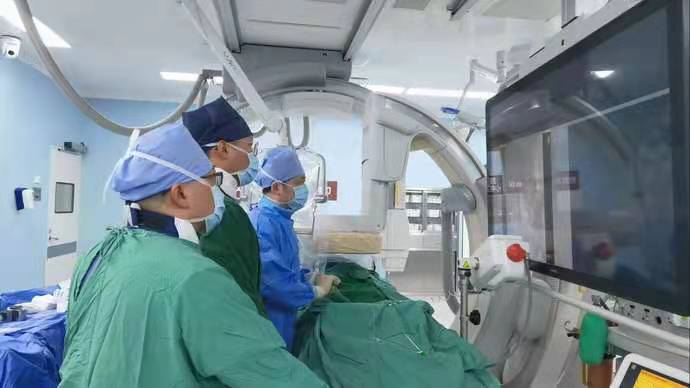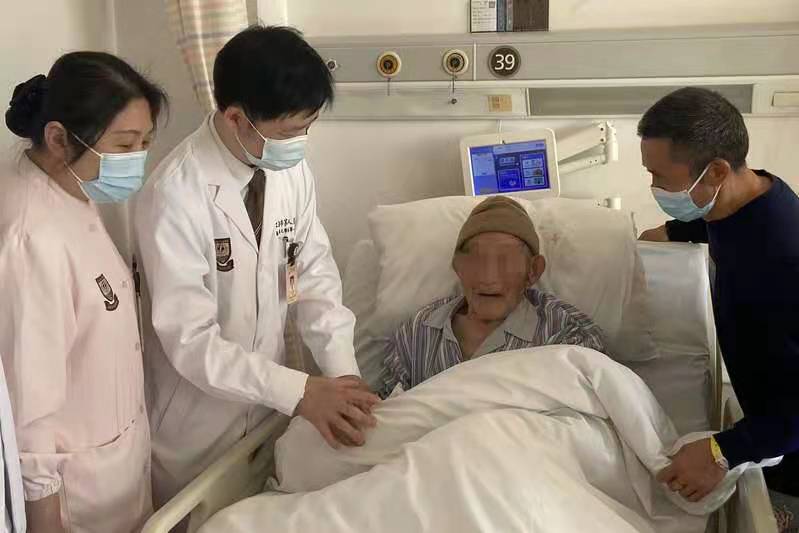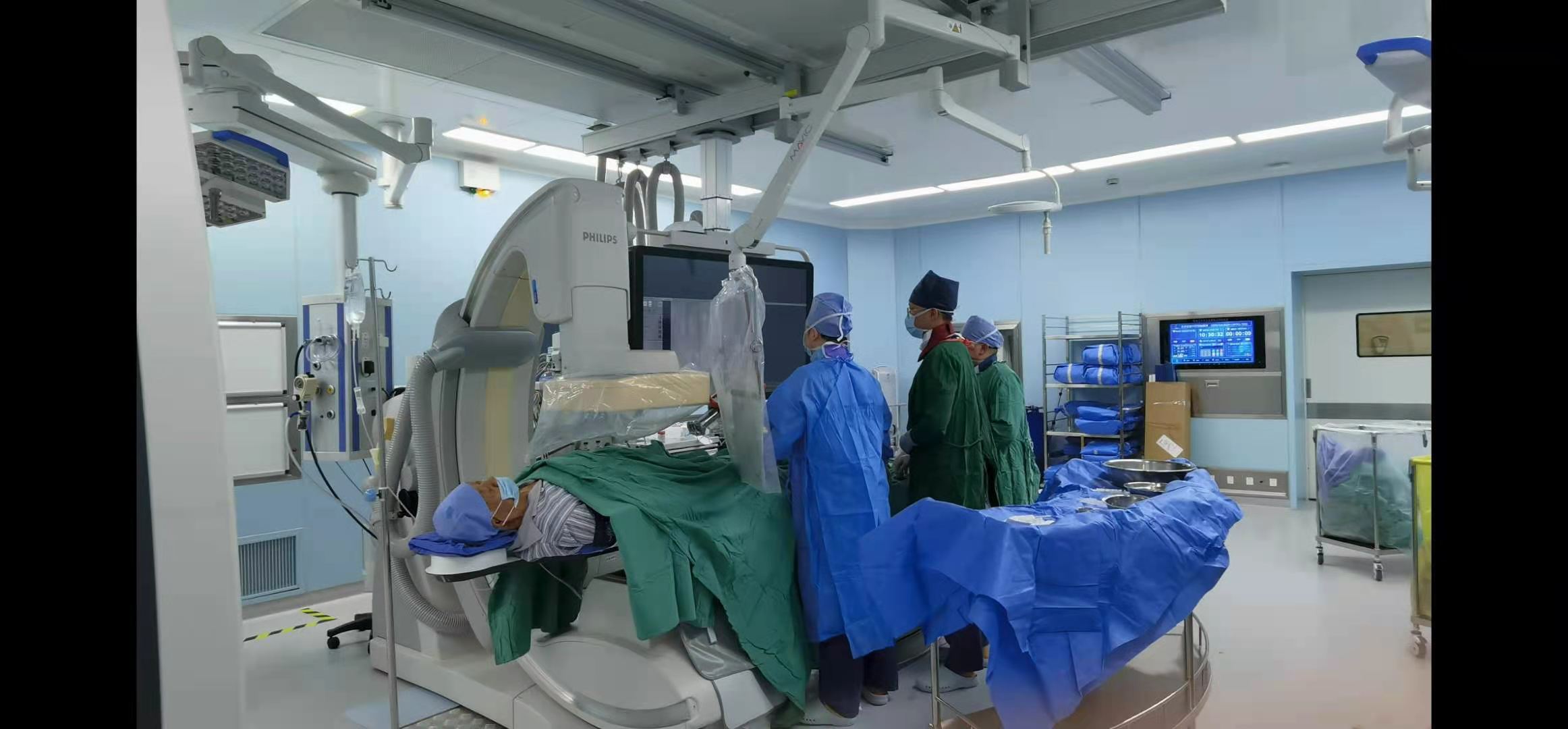- News
Sophisticated Aortic Minimal-invasive Surgery Guarding the Centenarians' Vascular Health by Dr. Rui Feng' Team
Link of the Original Article:
https://wap.xinmin.cn/content/32112580.html
With the growth of the aged population, the elderly patients with severe vascular disease are keeping expanding. Vascular diseases seriously threaten the life and health of the elderly people. But vascular diseases are not malignant diseases, the patients can survive for a long time and can get improved quality of life after effective treatment. Nowadays, with the improvement of medical level and medical technology, successful surgeries for the elderly people have created one miracle after another, bringing them better life.

Minimally invasive treatment of vascular disease in the elderly
Professor Feng Rui's team, director of the Vascular Surgery and Intervention Center at Shanghai General Hospital, has been treating about 30 elderly patients over 90 years old with vascular disease each year, not mention those over 80 years old which are commonplace for them. In the past three months alone, Prof. Feng Rui's team has successfully treated more than 10 patients over 90 years old with severe vascular diseases through minimal-invasive intervention. For examples, Mr. Jiang, a 103-year-old patient with abdominal aortic aneurysm, and Mr. Chen, a 102-year-old patient with lower limb arterial occlusion, were all successfully cured. To win the trust of so many elderly and even super-elderly patients, it relies on the advanced medical equipments and, more importantly, the advanced skills of the doctors.
Prof.Feng Rui introduced that the top three causes of death in the elderly, which are vascular system diseases, cancers and chronic respiratory diseases, which are 43.6%, 29.2% and 8.2% respectively. The elderly and super-elderly are characterized by more underlying diseases, poor physical conditions and high surgical risks. Common vascular system diseases include lower extremity artery occlusion, carotid stenosis, and renal artery stenosis, which cause ischemia or even infarction of vital organ or limbs. Other than these arteriosclerosis occlusive pathologies, some arteries undergo dilatation leading to abdominal aortic aneurysm, aortic dissection, renal aneurysm, and iliac aneurysm, et al, which are at risk of rupture and hemorrhagic shock .

Surgery for abdominal aortic aneurysm is rarely reported in patients over 100-year old over the world. Elderly people have reduced physiological function, complex underlying diseases. Their tolerance to surgery is largely reduced, thus the over stress response during the procedure can lead to multiple vital organ dysfunction, such as myocardial infarction, renal impairment, heart or respiratory dysfunction, et al, which always cause death. So on these basis, minimally invasive intervention technology has developed rapidly and can already cure most vascular diseases. With only a local anesthetic injection at the puncture site, treatment can be completed in a short time through a tiny puncture point, avoiding the extra cardiopulmonary risk that general anesthesia, and tracheal intubation may carry to the patients. By this way, it can minimize the risk of surgery in elderly patients.
Take Mr.Jiang, 103-year-old man, for example, the patient's abdominal aneurysm had exceeded the normal vessel diameter by more than four times and could rupture at any time. After precise planning of the treatment strategy and procedural details, Prof. Feng Rui's team finally chose the minimally invasive intervention using endovascular stent-graft, which imposed the least interference on the patient. The procedure was completed in 20 minutes with only 20 ml of bleeding, which is about the volume of half an egg.

The patient did not have any complications and discomfort, and was discharged from the hospital three days later.
Vascular surgeons still face a great challenge to provide safe and precise treatment for elderly and super-elderly patients with vascular disease. As an outstanding expert in minimal-invasive vascular treatment in China, Prof. Feng Rui tell the reporter that elderly people with vascular disease are often in fragile conditions, and surgery on them is like walking on thin ice. The key is to balance the risks carried by the advanced age and the severity of the vascular disease.
For patients over 100-year old who can be cured by surgery, age should not be considered as a unique criterion to determine whether to perform the procedure. It is more important to assess the patient's heart, lungs, kidneys and other important organs, and systemic conditions, so as to make thorough preoperative preparations, adopt the most concise surgery, and avoid adverse events in the perioperative period. This requires the medical doctors to be cautious in every step and every detail, from the time of first consultation to the final discharge.
Prof. Feng Rui summarized his rich experience in vascular surgery treatment for elderly patients as "eight principles": warm heartedness in reception; patience in communicating; devotion in formulating strategies; elaboration in preparing surgery plans; confidence in techniques; more care in surgical manipulation; love in postoperative nursing; and perseverance in follow-up.
Source:Xinmin Evening News, Author:Pan Jiayi
